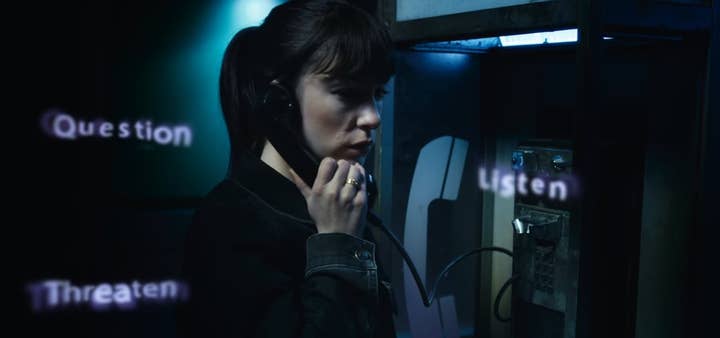The Bandersnatch effect
Netflix's Black Mirror outing has everyone talking about interactive fiction -- but what does this mean for the game developers who got there first?
It's a safe bet you've heard of Bandersnatch. Since the interactive Black Mirror episode went live on Netflix in the final days of 2018, there has been plenty of discussion online and across social media about the power of interactive fiction.
For those not in the know, Black Mirror: Bandersnatch is a film about a young programmer in the '80s trying to convert a choose-your-own-adventure book into a video game -- and, as with all Black Mirror stories, events take a darker turn.
What makes this stand out from the rest of Charlie Brooker's series is that said events are determined by the viewer, who is presented with choices that branch the film down different paths.
For many Bandersnatch viewers, the experience of shaping a story is brand new, and it's given them a taste for more. Book publisher Scholastic is already capitalising on this rising interest in interactive fiction by pushing the classic Fighting Fantasy series -- but of course there's another medium that has been honing this formula for decades.

"Gaming has been creating interactive movies and FMV titles for the last 30 years -- it's important that doesn't get lost in conversation," says Wales Interactive managing director David Banner, whose firm has published multiple interactive fiction titles -- including Late Shift, The Bunker, The Shapeshifting Detective, and The Infectious Madness of Doctor Dekker.
"In recent years' technology has allowed game creators to evolve the genre from low-budget, tongue-in-cheek titles to grown up cinematic experiences which are now much more sophisticated."
Jack Attridge, creative director and co-founder of FlavourWorks, agrees: "Pockets in the games industry have known for a while that interactive live action experiences could be the key to expanding the audience for games. When I showed the first prototype of our technology to Fumito Ueda a few years back his first response was, 'This could wake up the whole industry'. Bandersnatch was a good place to start by leveraging the Black Mirror IP."
"Games have been looking towards VR and AR as something new, but we've still got so much to surprise audiences with using existing screens"
Jack Attridge, FlavourWorks
He continues: "I imagine audiences flocked to Bandersnatch because it felt like something new, and ultimately that's always going to be a big initial pull for audiences. As an industry, we've been looking towards concepts like VR and AR as the answer to something new, but all this time we've still got so much to surprise audiences with using the existing screens in their home or the device in their pocket."
With such projects spilling over onto a mainstream TV and movie platform like Netflix, there is debate as to how these can be classified. In the past they have been dubbed FMV (Full Motion Video) games, although this isn't always accurate; producer Simon Sparks tells us The Bunker was a "half-motion game". Many lean towards interactive movie, though this arguably undersells the games development ingenuity behind it.
Doctor Dekker director Tim Cowles tells us this argument over semantics may actually prevent such titles reaching their audience: "Some Netflix viewers won't go near an FMV game, and some gamers won't go near an interactive film. We need to universally call them the same thing. In fact, let's call anything in either category a "Bandersnatch" -- just to add to the confusion -- and open the doors to gamers and non-gamers alike. At the moment there's a potential 'it's a film', 'no, it's a game' war brewing, which we need to flatten as soon as possible."

For our purposes, we'll refer to them as interactive movie games since it reflects both the live-action nature and the design ethos behind these titles. Regardless of what we call them, though, developers agree the popularity of Bandersnatch is a big opportunity.

Sparks says it paves a path to the "coveted audience of gamers who don't recognise themselves as gamers, which is the one everybody is trying to get to because it's a new audience."
Meanwhile, Banner describes the Black Mirror outing as "a real positive for the genre [that] highlights another potential platform for games industry developers and publishers to target."
He continues: "Film is just another medium to be used in gaming, and now the technology exists that allows us to stream and load video files faster and seamlessly, there are no technological barriers for taking interactive movies to the masses."
To date, interactive movie games have sold relatively well -- especially since many are made by indie studios -- but they have yet to set the world alight. Wales Interactive has published four over the past couple of years, accumulating over one million downloads. The audience is also more global than you might think, with 50% of the publisher's PC sales coming from China -- "That's an audience we never expected when we started," says Banner.
"It's still going to be hard to convert a non-gaming Netflix viewer into someone that's going to buy a console or download a game just because of Bandersnatch"
Tim Cowles, director
Cowles tells us Doctor Dekker and Shapeshifting Detective have sold a combined 50,000 units, while Sparks reports The Bunker managed 100,000 in its first two years. Could Bandersnatch boost these sales as audiences seek similar experiences?
"It fuels the conversation, and brings it to the fore," acknowledges Sparks. "Whether I think it will have a positive effect on sales of The Bunker, for instance... I don't know. Probably, but for how long? I don't know."
Banner adds: "Bandersnatch won't accelerate the interest as such, but it has brought it to the attention of the mainstream media."
Sales of Doctor Dekker actually spiked on the day Bandersnatch went live, although Cowles admits this also coincided with a 50% discount promotion. Nevertheless, activity on social media has shown the director plenty of gamers pointing Bandersnatch fans towards his works in the past few weeks.
"[Bandersnatch] reached all the existing Black Mirror fans, and potentially millions of Netflix subscribers who can easily access the content for free," he says. "This should have a positive effect for anyone working on similar projects, but only time will tell. It's still going to be hard to convert a non-gaming Netflix viewer into someone that's going to buy a console, or download a game to their computer just because of Bandersnatch."
Therein lies a barrier to that opportunity. Bandersnatch is accessible through Netflix, to which millions are already subscribed, but interactive movie games require a separate purchase. Additionally, Bandersnatch can be enjoyed through almost any device, while games must be played on the platform for which they were purchased.
Banner notes that while Wales Interactive's titles have been discussed in the same breath as Bandersnatch, and are available for multiple formats, there's "not a natural migration in terms of downloads."
"Live-action games of interactive movies - whatever their name - will definitely have a big future"
Tobias Weber, director of Late Shift
Sparks believes that the bigger opportunity for developers of interactive stories lies on "Netflix or a huge platform like that."
"That's real mass market stuff. It needs to sit between games and film," he continues. "Once you start to get big stars, big brands [involved]... imagine an interactive series based around the Marvel Cinematic Universe, between the films and focused on regular people like police officers dealing with the fallout. In the original Avengers, there was that waitress who says Captain America saved her life -- imagine being her, imagine navigating that attack and suddenly Captain America comes in. That would be so cool.
"I do think this is the start of something. Because Netflix is not stupid. It has invested heavily in the technology to make this happen... It feels like it needs that Avatar moment. That made you go, 'I need to watch this in 3D'. It's yet to happen [for interactive fiction]. The Bunker didn't do it. Late Shift arguably did, because people could see they had made an impact, that they'd had agency."
Tobias Weber, director of Late Shift, believes we're starting to see the "early adopters of this new paradigm" in Netflix and Hollywood studios such as 20th Century Fox, which is working with his firm CtrlMovie on a choose-your-own-adventure style film.

"The fact that such heavy weights are entering the arena is of course a good sign," he says. "The market to an extent needs to be educated about this new format between game and film, and these companies -- with their reach and marketing budgets -- are of course helping the cause in general."
Banner tells us all Wales Interactive titles are built to be multi-platform in the hopes they could one day be on Netflix or Amazon Prime Video, while Attridge says the specially-developed 'Touch Video' technology behind PS4 exclusive Erica has been built to "bring interactive live action experiences to audiences on phones, tablets, consoles, desktop, and even high-end TV media boxes."
That's not to say there's no future for interactive movie games on traditional gaming platforms. Weber tells us Late Shift has "done very well" on PS4 and Xbox One, while Sparks reports The Bunker actually "sold better on consoles than it did on PC and mobile" -- and that's despite the fact the mobile version was available for as little as £1.99, while the Xbox SKU cost as much as £14.99.
"Not that I think anyone has bought it at full price," laughs Sparks, "and if you have I'm really sorry."

For Cowles, it's important that video games continue to drive this evolving format forward.
"The platform barrier may be removed eventually if game streaming services continue to take hold and become integrated with TVs or TV devices," he says. "Until then, we need to continue to scream that Bandersnatch is essentially a video game and that FMV games are essentially an interactive film. Or lobby Netflix to start onboarding things like The Shapeshifting Detective and Late Shift to indicate this convergence is already taking place.

"People are comfortable playing video games if they're delivered in a TV setting like Netflix, in the same way that many people became comfortable playing games on their smartphones, but still wouldn't call themselves gamers."
While developers have been making interactive movie games for decades, there is still work to be done honing the experience they can provide. CtrlMovie, for example, is exploring the potential for communal choice -- Late Shift has been integrated with Mixer to enable people to play online together, and the firm has even built a voting system so that viewers in cinemas or at home can all vote on choices (with the film taking the most popular branch).
FlavourWorks' 'Touch Video' technology enables players to not only select choices, but interact with the live-action elements on screen, such as opening a draw or turning a page. While some suggest experienced movie-makers will drive interactive movie games forward, Attridge argues games developers who have already been working on such titles are better placed.

"There is bound to be much more success looking towards studios in the games industry rather than to approach filmmakers and expect them to have the deep skillset of interactivity and game design," he says. "Both games and film are complex art forms, and the success of any interactive film going forward will come down to a rare thing: a studio with expertise in both film, games, and most importantly the overlap between them."
Sparks believes smaller firms and indies will be crucial to the future of this genre: "[These are] the guys who've got a story to tell and want to do something interesting and quirky. Whereas the bigger companies... I mean, we pitched to EA and they said, and I quote, it was 'the best fucking pitch I've seen all year", but it didn't fit with their portfolio."
Weber remains confident that "live-action games of interactive movies - whatever their name - will definitely have a big future", while Cowles expects to see "a whole slew of FMV games and interactive films" announced and released in the next few years.
However, while the excitement around Bandersnatch undeniably presents an opportunity, Attridge warns that these projects must still take their time.
"The important thing is not to blow it by rushing out undercooked gimmicky uses of interactive live action, so that audience expectations are built on high quality experiences with constant and meaningful interactivity," he says.
"As long as high-profile interactive live-action experiences meet or exceed the bar set by Bandersnatch, then interactive storytelling will continue to draw in audiences."
Come back tomorrow for the second part of this feature, in which we ask these developers for advice on how to design and build interactive movie games.
